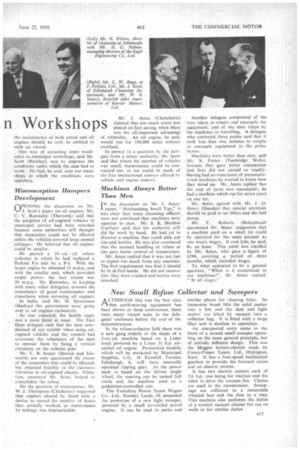Misconception Hampers Development
Page 49

If you've noticed an error in this article please click here to report it so we can fix it.
OPEN1NG the discussion on Mr. J. Scott's paper on oil engines, Mr. C. V. Rawnsley (Thurrock) said that the adoption of oil-engined vehicles in municipal service had been retarded because some authorities still thought that economies could not be effected unless the vehieles covered large annual mileages. He believed that oil engines could be smaller, He quoted a 10 -cu. yd. refuse collector in which he had replaced a Perkins P.6 unit by a P.4. With the larger engine he obtained 11 m.p.g., and with the smaller unit, which provided ample power, the fuel return was 20 m.p.g. Mr. Rawnsley, in keeping With many other delegates, stressed the importance of good maintenance and cleanliness when servicing oil engines. In India. said Mr. M. Sivaraman (Madras) the government were going over to oil engines exclusively. As was expected, the health angle was a main Point at issue. The East Ham delegate said that his men complained of eye trouble when using oilengined vehicles and the council had overcome the reluctance of the men to operate them by fixing a vertical extension on the exhaust pipe. Mr. F. B. Senior (Heston and Isleworth) not only questioned the extent of the economies that could he effected, hut objected forcibly to the excessive vibration in oil-engined chassis. Vibration, answered Mr. Scot1.. helped to consolidate [he. refuse. On the question of maintenance. Mr. W. J. Thompson (Chichester) suggested that engines should be fitted with a device to record the number of hours they actually worked, as maintenance hy mileage was impracticable.




































































































